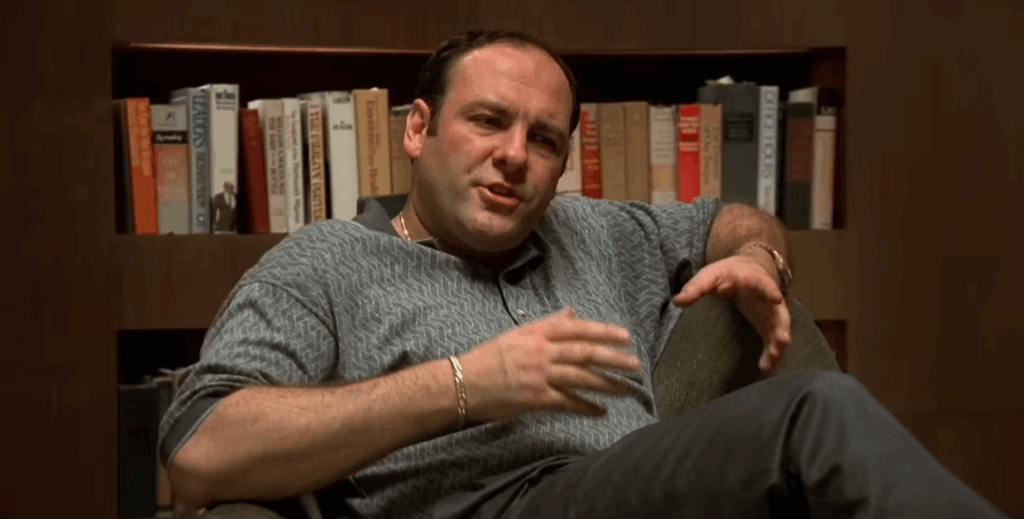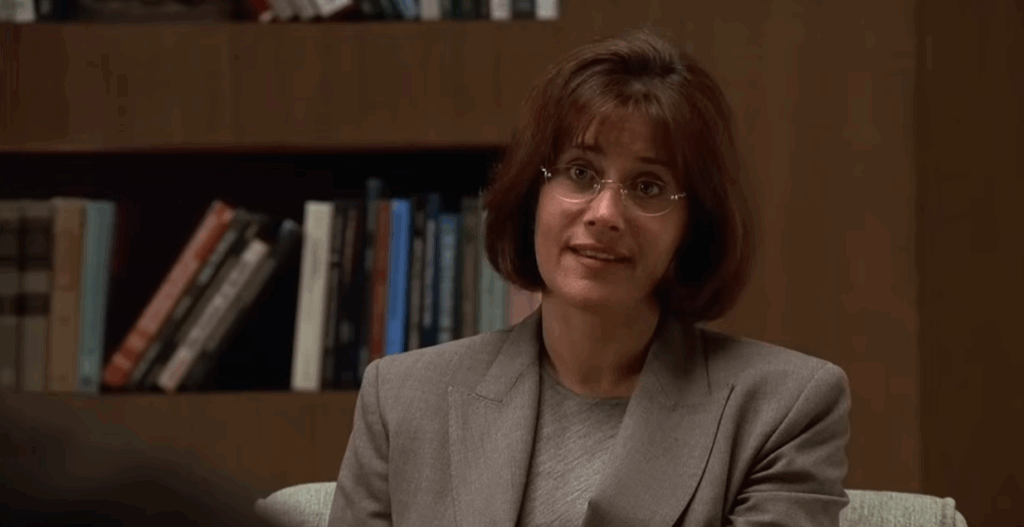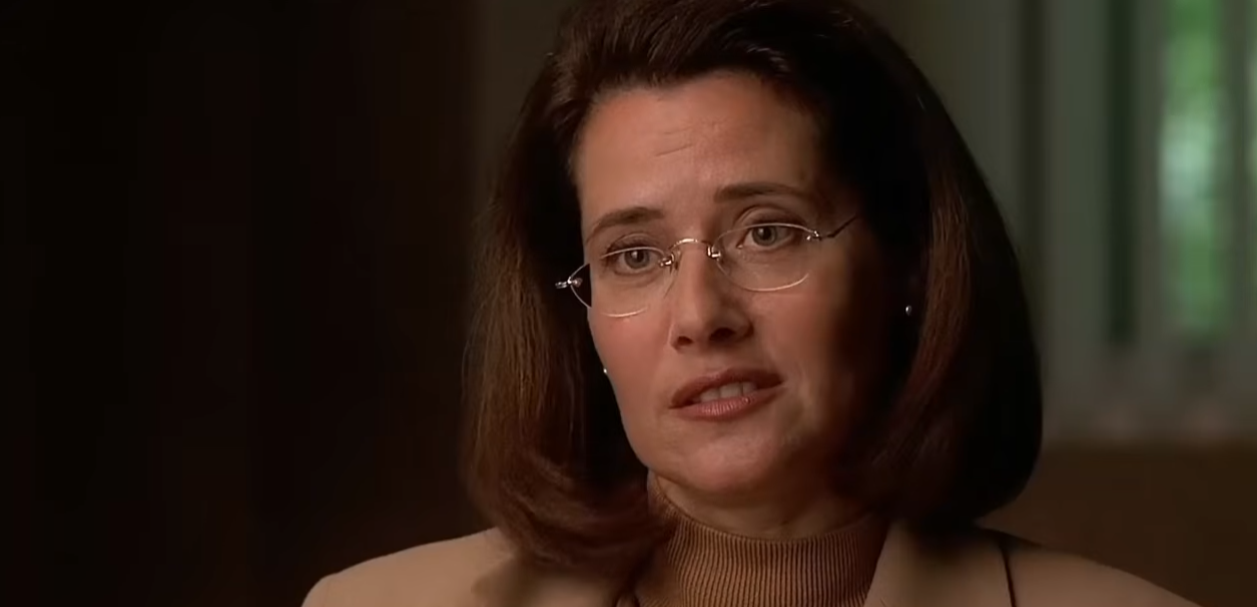The Sopranos Season 1 Explained | Dr. Melfi’s Sessions as a Mirror of Tony’s Soul
Intro
When The Sopranos premiered in 1999, television hadn’t yet learned to sit still with silence. But in a small, sterile therapist’s office in North Jersey, HBO taught us to listen , not to gunshots or wiretaps, but to breath, to hesitation, to the cracking of a man’s armor.
That’s where Tony Soprano meets Dr. Jennifer Melfi, and where the mob myth finally meets the human mind. Every session between them in Season 1 isn’t just therapy , it’s a cinematic duel, a confession booth without God, and the mirror through which we watch a gangster unravel.
The Office as a Confessional Stage

The moment Tony sits in that beige chair, the show shifts tone. Outside, the world runs on fear, cash, and hierarchy; inside, it runs on vulnerability. The camera slows down, light flattens, sound softens , we’re no longer in Goodfellas territory, we’re in the quiet corridors of the psyche. Dr. Melfi’s office becomes a neutral battlefield. Her voice is calm but invasive; Tony’s, defensive but searching. Each question she asks functions like a cinematic close-up: it pulls us closer until the performance cracks.
Through her eyes, we stop seeing the boss. We see the boy who watched violence as a form of love, the son who never heard tenderness except through control. Melfi becomes our interpreter , she decodes Tony’s anger into language the audience can bear to hear.
📂Don’t just watch the show, analyze it. Grab Dr. Melfi’s confidential ‘Psychological Dossier’ on Tony (and the truth about the ending) here
The Therapist as the Camera

If David Chase’s lens shows Tony’s external life , cigars, dinners, hits , Dr. Melfi provides the internal one.
She doesn’t just listen; she frames. Every silence she allows is an edit. Every redirect , from mob business to mother issues , is narrative control. When Tony storms out, we see a man running from his own script. When he stays, slouched and heavy, we see a man who knows the story can’t end well but still wants to know the last line. Her perspective reveals the show’s central paradox: the closer Tony gets to self-awareness, the more dangerous he becomes. The therapy, meant to humanize him, also re-arms him. Knowledge of his triggers gives him leverage in the world outside , even as it hollows him inside.
Maternal Ghosts and Freudian Echoes
Season 1’s great psychological triangle is Tony, Livia, and Melfi , the mother who birthed him, and the woman who dares to understand him. Livia’s manipulation is emotional warfare; Melfi’s is analytical compassion. Both challenge his authority, both expose his helplessness. In classic Freudian fashion, Tony’s sessions are haunted by transference. He begins to flirt, to intimidate, to charm , the only emotional languages he knows. Melfi resists, becoming both the mother he fears and the moral line he can’t cross.
That tension , desire vs. dependence, rage vs. reflection , fuels the entire emotional rhythm of Season 1. When Tony defends his mother’s cruelty or laughs off her neglect, Melfi’s micro-reactions tell the truth his words can’t: he’s a son begging for warmth from a ghost.
The Ducks and the Diagnosis

In their earliest sessions, Tony talks about ducks. To Melfi, it’s an obvious symbol , but she never rushes the revelation. She lets him stumble toward it, lets him feel the loss before naming it.
That patience defines her role as the series’ emotional metronome. Through her, we learn that Tony’s panic isn’t fear of death , it’s fear of abandonment. The ducks represent family, order, innocence. When they fly away, they take with them the illusion that Tony’s world is safe. For the audience, that’s the first time we see the man beneath the myth , not the predator, but the orphaned child inside the predator. Melfi doesn’t cure him; she opens the wound wide enough for us to see inside.
Ethics and Intimacy
Melfi’s struggle isn’t just professional; it’s existential. She’s treating a man she knows is a criminal, possibly a killer. Yet the more she understands him, the harder it becomes to judge him. That moral blur is what makes her more than a side character , she’s the conscience the show refuses to externalize. Through her, we wrestle with our own complicity: we, too, enjoy Tony’s charisma, laugh at his jokes, root for his success.
By Season 1’s ending, Melfi realizes what the audience does , she can’t save him. Therapy might soothe his panic, but it can’t rewrite his code. The moment she admits that, she becomes the audience’s stand-in for disillusionment. We wanted a cure; all we get is clarity.
The Mirror and the Reflection
Ultimately, Dr. Melfi is not Tony’s savior , she’s his reflection.
Each session reveals what he’s fighting hardest to hide: the awareness that he’s both victim and villain, patient and predator. When he leaves her office, he returns to his rituals , envelopes, dinners, loyalty tests , but something lingers in his expression. It’s not guilt exactly. It’s the quiet horror of self-recognition.
That’s why their scenes matter more than any mob war. The therapy room is the one place Tony can’t lie with violence. The man who controls everyone else can’t control the silence between his therapist’s questions.
The Soul in the Chair
Season 1 of The Sopranos built its mythology not from bullets, but from conversations.
Dr. Melfi’s sessions are where we see what television rarely shows: a man of immense external power confronted by the emptiness within. For all the bloodshed and bravado, Tony’s greatest battles happen on that couch , the softest piece of furniture in the series. There, between confession and denial, between the doctor and the mobster, The Sopranos becomes not just a crime story… but a psychological epic about the impossibility of peace in a world built on fear.
Dr. Melfi doesn’t cure Tony Soprano. She reveals him. And in doing so, she reveals us , the viewers who can’t look away from the reflection.













Post Comment